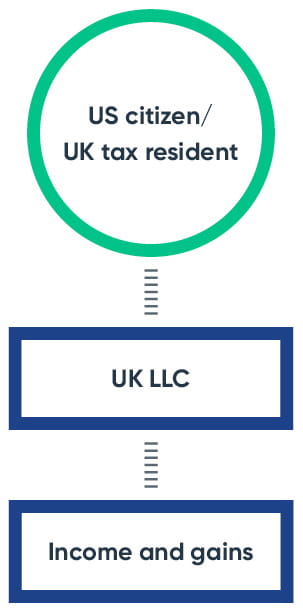- Accueil
- Actualités et public…
- Publications
- Use it or lose it, b…
- Sur cette page
25 janvier 2021
Use it or lose it, but beware the UK
- Briefing
A whirlwind of estate planning is being carried out for US individuals since the Biden election win. There are a number of potential traps to navigate when planning for dual US/UK residents and nationals. What should you be aware of when advising on estate planning for US individuals with links to the UK?
Flurry of US estate planning after Biden 2020 election win
Many US tax and estate advisers are frantically busy following the US election win by Joe Biden. That win promises to bring with it significant tax changes (and likely rate hikes) in the US.
For US tax and estate advisers, the focus has been on the various hints and proposals on tax reforms referred to in the course of the Biden campaign. Many see these proposals as the inevitable reversal by the Democratic, newly inaugurated President Biden, of President Trump's tax rule changes (implemented by the Tax Jobs and Cuts Act 2017).
Set within the context of the significantly increased US national debt caused by the ongoing COVID crisis, it's clear that there is likely to be more appetite to tax UHNW individuals in the US in the coming months and years.
The flipping of the Senate to Democrat will give the Biden administration more – albeit certainly not unlimited – latitude to make changes to the US tax code. Although the extent of what Biden will be able to achieve is unclear, one thing is almost certain: the tax burden assumed by wealthy Americans is only likely to increase in the coming years.
Possible tax changes during Biden Presidency
What then, are some of the possible US tax changes coming down the pipeline after Joe Biden's Inauguration as the 46th US President on 20 January 2021?
A few specific proposals are as follows:
- Reduction of the current historically high Federal estate and gift tax lifetime exemption of $11.58m. Reducing to closer to $5.5m and possibly lower has been discussed.
- Elimination of the step-up in basis for inherited assets, with the effect of possible tax charges on latent gains on death.
- Doubling of the rate of tax (from 10.5% to 21%) charged on income of controlled foreign companies ie non-US businesses owned or controlled by relevant US individuals or businesses.
If some or all of these rule changes are implemented in the US this will have a significant impact for both Americans living in the UK (and abroad generally), as well as for UK individuals resident and/or domiciled in the US.
Gifts to trusts by US individuals
"Use it or lose it" is the current refrain of the US advisor talking to UHNW clients, this being a recommendation to make use of the client's unused US estate and gift tax exemption in case the Biden administration reduces this from the current amount of $11.58m.
One common planning route is for the wealthy US client to make a completed gift to a trust of assets of a value within his or her unused gift and estate tax exemption. Where problems can arise is when that US client is also treated as UK domiciled. The gift to the trust – which may make total sense from a US estate tax perspective – runs the risk of triggering an immediate UK inheritance tax (IHT) liability for the client, as well as ongoing IHT charges for the trustees of the recipient trust.

- Potential immediate 20% inheritance tax charge on gift into trust (subject to any reliefs).
- Ongoing IHT charges for trustees.
Risk of tainting UK protected trusts
In 2017 significant changes were made to UK tax legislation affecting the way in which UK resident non-domiciliaries, as well as trusts created by them, are taxed in the UK.
Those rule changes were wide-reaching; however, they did afford certain protections from immediate UK taxation to foreign (ie non-UK) income and capital gains realised in the trust, as long as certain conditions are met on an ongoing basis for the trust. Significantly, however, those protections from immediate UK taxation will fall away for all time for a previously protected trust if the relevant conditions are not met at any time.
By way of illustration, a trust can lose its UK protected trust status forever as a result of something as simple as the Deemed Domiciled settlor entering into a loan arrangement with the trustees on terms that do not fall within the very prescriptive parameters of the relevant UK anti avoidance legislation. This can have catastrophic UK tax consequences for that Deemed Domiciled settlor.

- Potential immediate 20% IHT charge on gift to trust.
- Trust loses 'protected' status with effect that all trusts income and gains taxable on settlor as they arise.
Potential double taxation nightmare
Planning being implemented for the US client ahead of any tax changes may involve the sale or other restructuring of US corporate entities. Another familiar trap for the unwary advisor of US clients with links to the UK arises from the potential mismatch in the tax treatment of certain US corporate entities (for example, LLCs and S-Corps) as between the US and the UK.
In the worst-case scenario this can result in income and capital gains of the US corporate entity being subject to tax in both the US and the UK.

- Subject to US income tax on share of income and gains as they arise.
- Potentially subject to UK tax on distribution from LLC and on disposal of interest in the LLC.
The above should serve as a reminder of the need to take care and seek specialist UK advice when advising clients with links to the UK. This is particularly the case in the current climate of US tax driven planning being carried out in relative haste, in anticipation of the possible US tax changes being enacted by President Biden. Our Private Wealth team would be happy to speak with you about any of your concerns, queries, or specific challenges being faced by your clients.

